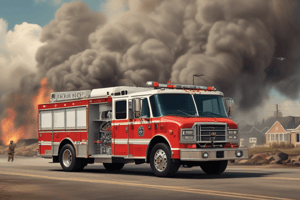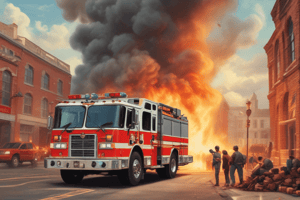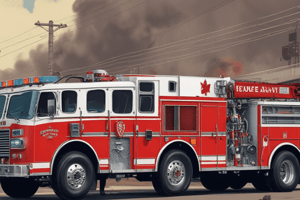Podcast
Questions and Answers
What is the first action that units not being dispatched should take?
What is the first action that units not being dispatched should take?
- Proceed to the incident site to assist
- Prepare to respond if called upon
- Remain in service and refrain from adding themselves to the incident (correct)
- Immediately contact the Comm Center
In a Commercial / Multi-Family structure fire response, how many Aerial units are dispatched?
In a Commercial / Multi-Family structure fire response, how many Aerial units are dispatched?
- Two (2) (correct)
- Four (4)
- One (1)
- Three (3)
What should an officer in charge of an apparatus do if the incident information suggests a change in response?
What should an officer in charge of an apparatus do if the incident information suggests a change in response?
- Request more units from the Comm Center
- Reassess the situation before taking action
- Upgrade the response based on the information (correct)
- Contact all nearby units to prepare for response
For a Residential structure fire response, which of the following units are dispatched?
For a Residential structure fire response, which of the following units are dispatched?
When should units that discover they are closer than dispatched units take action?
When should units that discover they are closer than dispatched units take action?
How many ALS Medic Units are included in a Commercial / Multi-Family structure fire response?
How many ALS Medic Units are included in a Commercial / Multi-Family structure fire response?
Which vehicle is not included in the Residential structure fire response?
Which vehicle is not included in the Residential structure fire response?
What must be done if an officer upgrades the unit response based on incident information?
What must be done if an officer upgrades the unit response based on incident information?
Which statements about non-emergency responses are accurate?
Which statements about non-emergency responses are accurate?
What is the primary responsibility of the Fire Chief regarding the response guidelines?
What is the primary responsibility of the Fire Chief regarding the response guidelines?
What is the preferred method for personnel response when only three personnel are on duty for a UTV incident?
What is the preferred method for personnel response when only three personnel are on duty for a UTV incident?
Under what circumstance can an officer downgrade a response from emergency to non-emergency?
Under what circumstance can an officer downgrade a response from emergency to non-emergency?
What happens if a non-staffed station's apparatus is dispatched without a staffed apparatus?
What happens if a non-staffed station's apparatus is dispatched without a staffed apparatus?
For a Rescue or Evacuation Boat response, how many personnel from the on-duty crew should ideally respond with the towing vehicle?
For a Rescue or Evacuation Boat response, how many personnel from the on-duty crew should ideally respond with the towing vehicle?
Which of the following is NOT classified as a non-emergency response?
Which of the following is NOT classified as a non-emergency response?
In a freeway response scenario, what is the role of the Heavy Utility Truck (HUT)?
In a freeway response scenario, what is the role of the Heavy Utility Truck (HUT)?
What should be done if staffing does not allow for a response by a Heavy Utility Truck in a freeway incident?
What should be done if staffing does not allow for a response by a Heavy Utility Truck in a freeway incident?
Which of the following is true regarding automatic vehicle locators (AVL) and non-staffed stations?
Which of the following is true regarding automatic vehicle locators (AVL) and non-staffed stations?
What is the standard response for a gas leak inside a commercial or multi-family building?
What is the standard response for a gas leak inside a commercial or multi-family building?
When responding to a mutual aid incident, what should happen if a non-staffed apparatus is dispatched?
When responding to a mutual aid incident, what should happen if a non-staffed apparatus is dispatched?
What should all in-service apparatus avoid doing when responding to incidents?
What should all in-service apparatus avoid doing when responding to incidents?
How many personnel are preferred to respond with a Tanker or Booster to an out-of-district emergency incident?
How many personnel are preferred to respond with a Tanker or Booster to an out-of-district emergency incident?
Which type of response is required for incidents not classified as non-emergency?
Which type of response is required for incidents not classified as non-emergency?
In station medical responses, which vehicle should respond first?
In station medical responses, which vehicle should respond first?
What units should be dispatched for a gas leak outside?
What units should be dispatched for a gas leak outside?
What is the primary function of a 'blocker' apparatus in an emergency response?
What is the primary function of a 'blocker' apparatus in an emergency response?
In which scenario is it acceptable for one personnel to respond in the HUT/LMTV?
In which scenario is it acceptable for one personnel to respond in the HUT/LMTV?
What is the primary role of the officer in charge of the apparatus during a gas leak incident?
What is the primary role of the officer in charge of the apparatus during a gas leak incident?
What is the minimum personnel response to a UTV incident if four personnel are on duty?
What is the minimum personnel response to a UTV incident if four personnel are on duty?
What is required for an out-of-district response involving a heavy utility truck (HUT/LMTV)?
What is required for an out-of-district response involving a heavy utility truck (HUT/LMTV)?
During a gas leak inside a residential property, which unit is dispatched?
During a gas leak inside a residential property, which unit is dispatched?
What must units do if they discover they are closer than the ones dispatched?
What must units do if they discover they are closer than the ones dispatched?
Study Notes
Spring Fire Department Response Model
- The Spring Fire Department Response Model provides guidelines for responding to various incidents.
- All Spring Fire Department personnel must comply with the manual.
- The Fire Chief or designee reviews this guideline annually.
Non-Staffed Stations
- When a non-staffed station’s apparatus is dispatched to an incident, the closest staffed apparatus, via automatic vehicle locator (AVL), will also be dispatched.
- If a staffed apparatus is not dispatched to an incident, the closest staffed apparatus will add themselves to the incident and respond.
- Non-staffed station medical incidents are exempt from requiring the closest staffed apparatus to respond.
Non-Emergency Responses
- Non-emergency incidents will be responded to in a non-emergency mode.
- The officer in charge of the apparatus has the autonomy to upgrade to an emergency response if needed.
- Non-emergency incidents include controlled burns, smoke in the area, fluid spills, live wires, transformer fire, back-in assignments, assist a citizen, assist law enforcement, and automatic alarms.
Emergency Responses
- All incidents not classified as non-emergency incidents will be responded to in emergency mode.
- The officer in charge of the apparatus has the autonomy to downgrade to non-emergency if deemed necessary based on call information.
- All in-service apparatus should refrain from adding themselves to incidents to ensure they are available for other emergency incidents.
Light Structure Responses
- Residential: Two (2) Spring Fire Department staffed apparatus.
- Commercial / Multi-Family: One (1) District Chief, Two (2) Spring Fire Department staffed apparatus, One (1) Aerial.
- The closest units are dispatched via automatic vehicle locator (AVL) by the Comm Center.
- If a unit is closer than the ones dispatched, contact the Comm Center and request to be added, and disregard the other unit.
Structure Fire Responses
- Residential: One (1) District Chief, Five (5) Engines, One (1) Aerial, One (1) Rescue Truck, One (1) Rehab/Cascade Vehicle, One (1) ALS Medic Unit.
- Commercial / Multi-Family: One (1) District Chief, Five (5) Engines, Two (2) Aerials, One (1) Rescue Truck, One (1) Rehab/Cascade Vehicle, One (1) ALS Medic Unit.
- The closest units are dispatched via automatic vehicle locator (AVL) by the Comm Center.
- If a unit is closer than the ones dispatched, contact the Comm Center and request to be added, and disregard the other unit.
Extrication Responses
- In-District: One (1) District Chief, One (1) Engine or Two Engines if on freeway main-lanes, One (1) Apparatus with extrication equipment, One (1) Rescue.
- Out-of-District: One (1) District Chief, One (1) Rescue Truck or One (1) Apparatus with extrication equipment.
- The closest units are dispatched via automatic vehicle locator (AVL) by the Comm Center.
- If a unit is closer than the ones dispatched, contact the Comm Center and request to be added, and disregard the other unit.
Gas Leak Responses
- Odor of Gas: One (1) Engine.
- Gas Leak Inside-Residential: One (1) Engine.
- Gas Leak Inside-Commercial / Multi-Family: One (1) District Chief, Two (2) Spring Fire Department staffed apparatus, One (1) Aerial.
- Gas Leak Outside: One (1) District Chief, Two (2) Spring Fire Department staffed apparatus.
- The closest units are dispatched via automatic vehicle locator (AVL) by the Comm Center.
- If a unit is closer than the ones dispatched, contact the Comm Center and request to be added, and disregard the other unit.
Tanker or Booster Responses
- Two (2) personnel from the on-duty crew shall respond with the Tanker/Booster to the dispatched incident.
- The remaining two (2) personnel shall respond with the staffed apparatus to provide manpower.
- If only three (3) personnel are on duty, one (1) person can respond in the Tanker, but this is not the preferred method.
Heavy Utility Truck (HUT)/LMTV Responses
- Two (2) personnel from the on-duty crew shall respond with the HUT/LMTV to the dispatched incident.
- The preferred method is one (1) personnel from each staffed apparatus.
- The remaining personnel will stay back to continue staffing the normally staffed apparatus and be available to respond to other emergency incidents.
- If staffing does not permit a two (2) person response, one (1) person can respond in the HUT/LMTV, but this is not the preferred method.
Utility Task Vehicle (UTV) Responses
- Two (2) personnel from the on-duty crew or Rescue Truck shall respond with a Utility Vehicle capable of towing the UTV and trailer to the dispatched incident.
- The remaining two (2) personnel shall respond with the staffed apparatus to provide manpower.
- If only three (3) personnel are on duty, one (1) person can respond in the Utility Vehicle capable of towing the UTV, but this is not the preferred method.
Rescue/Evacuation Boat(s) Responses
- Two (2) personnel from the on-duty crew or Rescue Truck shall respond with a Utility Vehicle/Booster capable of towing the Rescue/Evacuation Boats and trailer to the dispatched incident.
- The remaining two (2) personnel shall respond with the Rescue Truck or staffed apparatus to provide manpower.
- If only three (3) personnel are on duty, one (1) person can respond in the Utility Vehicle capable of towing the Rescue/Evacuation Boats and trailer, but this is not the preferred method.
Station Medical Responses
- The closest staffed apparatus shall respond to their respective station medical responses.
- Specialty staffed apparatus, i.e. Aerial/Rescue, shall respond to additional station medical responses for their respective station if the primary staffed apparatus is not in service.
Freeway Responses
- The closest staffed apparatus and Heavy Utility Truck (HUT) will be dispatched and shall respond.
- The first arriving apparatus shall position themselves to block the scene and position close enough to begin providing patient care.
- The Heavy Utility Truck (HUT) shall stop “up-stream” from the incident and position as an additional scene blocker.
- If staffing does not allow for a response by a Heavy Utility Truck, the officer in charge shall ensure a “blocker” apparatus is dispatched.
- This "blocker" apparatus shall stop “up-stream” from the incident and position as an additional scene blocker.
Mutual Aid Responses
- When a non-staffed apparatus is dispatched to a mutual aid response, the closest staffed apparatus shall respond with the non-staffed apparatus.
- If a staffed apparatus is dispatched to a mutual aid incident, the staffed apparatus shall respond as requested.
Studying That Suits You
Use AI to generate personalized quizzes and flashcards to suit your learning preferences.
Related Documents
Description
Test your knowledge on the Spring Fire Department Response Model, including guidelines for incident response, non-staffed stations, and non-emergency responses. This quiz will cover important procedures and protocols that ensure effective operation and safety during incidents.




